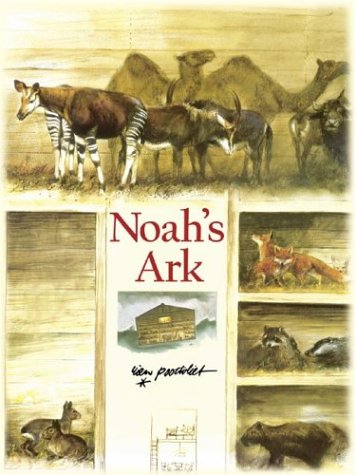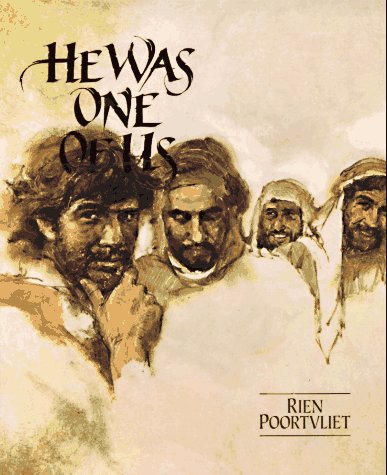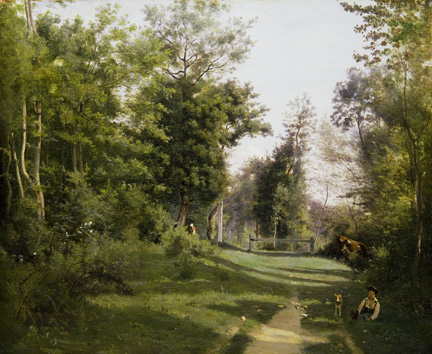Just want to remind you that these posts are not time sensitive so if you don't like a given artist, musician or poet you can go back in the archives and find one you prefer. If you are new to this blog, some of my favorites have already been covered and it would be a shame to miss out on some of them, so feel free to browse back through the old posts. When I first started, I staggered the introduction of a new artist, musician and poet to make it easier to take time for biographical introductions, but more recently I have been switching quarterly - three months on one artist, musician and poet. This is our last week with the current ones so next week they will all be new for the winter quarter. Here is a link to the Picasa Web album with all of our upcoming paintings for this quarter in case you want to print them ahead.
Even in this plain blue sky, Jean-Baptiste-Camille Corot manages to have an active, realistic sky, adding pink, blue and purple to his otherwise green and tan landscape. Notice all the diagonal lines in this painting. Diagonal lines give a painting motion and action. Again, I like his use of light and shadow to sharply define things. I'd love to scramble up the stairs and see the view from the top of the hill....
 Rien Poortvliet was a dutch artist (1932-1995) whose paintings our family has enjoyed very much and I'd like to recommend several of his books. Noah's Ark is full of wonderful animal paintings. Rien has a wonderful sense of humor and we have enjoyed this book very much. It is quite expensive, even used, but I have ordered it in through our local library.
Rien Poortvliet was a dutch artist (1932-1995) whose paintings our family has enjoyed very much and I'd like to recommend several of his books. Noah's Ark is full of wonderful animal paintings. Rien has a wonderful sense of humor and we have enjoyed this book very much. It is quite expensive, even used, but I have ordered it in through our local library.
 He was One of Us is a powerful portrayal of the life of Christ - I highly recommend this book!! The expressions on the faces of his people are amazing.
He was One of Us is a powerful portrayal of the life of Christ - I highly recommend this book!! The expressions on the faces of his people are amazing.
 The Living Forest is full of wonderful animal paintings and Dutch Treat has interesting details about the Dutch country and history all illustrated with Rien's wonderful paintings. He is best known for his Gnome books. His paintings are too new to be in the public domain so I won't be featuring him on my blog but I thought you might enjoy his work through his books.
Today's piece by John Philip Sousa is El Capitan. You can listen to it here.
"El Capitan is an operetta in three acts by John Philip Sousa and has a libretto by Charles Klein (with lyrics by Charles Klein and Tom Frost). The piece was Sousa's first successful operetta and his most successful stage work." Here is the link to the rest of this Wikipedia article.
I don't feel ready for winter, but in our part of the world it's here anyway, maybe this poem by Robert Louis Stevenson will help....
The Living Forest is full of wonderful animal paintings and Dutch Treat has interesting details about the Dutch country and history all illustrated with Rien's wonderful paintings. He is best known for his Gnome books. His paintings are too new to be in the public domain so I won't be featuring him on my blog but I thought you might enjoy his work through his books.
Today's piece by John Philip Sousa is El Capitan. You can listen to it here.
"El Capitan is an operetta in three acts by John Philip Sousa and has a libretto by Charles Klein (with lyrics by Charles Klein and Tom Frost). The piece was Sousa's first successful operetta and his most successful stage work." Here is the link to the rest of this Wikipedia article.
I don't feel ready for winter, but in our part of the world it's here anyway, maybe this poem by Robert Louis Stevenson will help....
Winter-Time
From Child's Garden of Verses
Late lies the wintry sun a-bed,
A frosty, fiery sleepy-head;
Blinks but an hour or two; and then,
A blood-red orange, sets again.
Before the stars have left the skies,
At morning in the dark I rise;
And shivering in my nakedness,
By the cold candle, bathe and dress.
Close by the jolly fire I sit
To warm my frozen bones a bit;
Or with a reindeer-sled, explore
The colder countries round the door.
When to go out, my nurse doth wrap
Me in my comforter and cap;
The cold wind burns my face, and blows
Its frosty pepper up my nose.
Black are my steps on silver sod;
Thick blows my frosty breath abroad;
And tree and house, and hill and lake,
Are frosted like a wedding cake.
 John Milton wrote several sonnets. Here is Sonnet VI and its translation.
John Milton wrote several sonnets. Here is Sonnet VI and its translation.
Sonnet VI.
Giovane piano, e semplicetto amante
Poi che fuggir me stesso in dubbio sono,
Madonna a voi del mio cuor l'humil dono
Faro divoto; io certo a prove tante
L'hebbi fedele, intrepido, costante,
De pensieri leggiadro, accorto, e buono;
Quando rugge il gran mondo, e scocca il tuono,
S 'arma di se, e d' intero diamante,
Tanto del forse, e d' invidia sicuro,
Di timori, e speranze al popol use
Quanto d'ingegno, e d' alto valor vago,
E di cetra sonora, e delle muse:
Sol troverete in tal parte men duro
Ove amor mise l 'insanabil ago.
(As translated in The Poems of John Milton by James Holly Hanford
Enamoured, artless, young, on foreign ground,
Uncertain whither from myself to fly,
To thee, dear Lady, with an humble sigh
Let me devote my heart, which I have found
By certain proofs, not few, intrepid, sound,
Good, and addicted to conceptions high:
When tepests shake the world, and fire the sky,
It rests in adamant self-wrapt around,
As safe from envy, and from outrage rude,
From hopes and fears that vulgar minds abuse,
As fond of genius and fixed fortitude,
Of the resounding lyre, and every muse.
Weak you will find it in one only part,
Now pierced by Love's immedicable dart.
Here is another translation I found online (quite different from the first)
Of lovers I, a simpleton content
To flee himself (great little understood)
Do bid you take, my Lady, if you would,
My humble heart, with proof in such extent:
It was intrepid and of faith unbent,
With graceful thoughts, most courteous and good;
When exploits roaring rent the starry hood
It armed its might in native adament;
Shunning resentment and from chance secure,
Its bulk inured from hope and fear's abuses,
Kept kin to genius, proffers brave of heart,
As lyric strains amongst its arduous muses,
And only, you will find, can less endure
In that one spot where Love has put his dart.
~John Milton, sonnet 6 (from the Italian)















